Empty Glass Cells

- 50 mm, 100 mm, or 500 mm Long Empty Borosilicate Glass Cells for Spectroscopy
- Ø12.7 mm, Ø25 mm, or Ø50 mm Flat Windows
- Available with One or Two Fill Tubes
- Custom Solutions Available
GC252
Two Fill Tubes, Ø25 mm Windows
Application Idea
The KF25C050 Ø1/2" compression fitting provides compatibility with KF25-flanged vacuum systems.
GC251L
One Fill Tube,
Ø25 mm Windows
GCV501
One Fill Tube with
J. Young® Valve,
Ø50 mm Windows
Borosilicate Cell
KF25C050 KF25 Flange to Compression Fitting Adapter
KF25WNC Wing Nut Clamp, KF25CR-F Centering O-Ring Inside

Please Wait
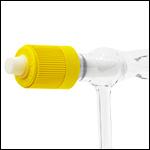
Click to Enlarge
The GCV251 and GCV501 Empty Glass Cells feature a J. Young ® Valve that can be closed to maintain a high-vacuum seal.
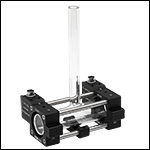
Click to Enlarge
Our Ø25 mm glass cells can be mounted in our GCH25-75 Heater using four ER4 cage rods.
Features
- Empty Glass Cells for Spectroscopy Applications
- 50 mm Long Glass Cell:
- Both Ends Include Ø12.7 mm Windows
- Available with One Tube for Filling
- 100 mm Long Glass Cells:
- Both Ends Include Ø12.7 mm, Ø25 mm, or Ø50 mm Windows
- Available with One Tube for Filling or Two Tubes for Flow
- Single Fill Tube Cells Also Available with Genuine J. Young®* Valve for Sealing
- 500 mm Long Glass Cell:
- Both Ends Include Ø25 mm Windows
- Available with One Tube for Filling
- Borosilicate Substrate for Cell and Windows
- High Transmission from 350 to 2200 nm
- Custom Design and Manufacturing Services Available (Contact Tech Support)
- Ø12.7 mm and Ø25 mm Cells are Compatible with a Variety of Heaters
- Glass Cells Also Available with GL-32 Threading for Interchangeable Windows
These empty borosilicate glass cells can be filled with vapors of specific atomic elements or molecular compounds, each of which has a well-defined absorption spectrum. Cells are available with either one or two fill tubes. A single fill tube is useful when sealing a cell while two fill tubes can be used to maintain constant gas flow. We also offer empty cells with a single fill tube and a J. Young® Valve to seal the cell with a high-vacuum, greaseless stopcock (see the image to the upper right). Fill tubes with a 0.25" outer diameter are compatible with Ø1/4" compression fittings, and fill tubes with a 0.5" outer diameter are compatible with Ø1/2" compression fittings, as shown on the Vacuum Seal tab. As shown in the video to the right, custom reference cells can be manufactured upon request, including different cell lengths, cell diameters, or fill tube configurations. Please contact Tech Support with inquiries.
Each cell is made from borosilicate glass, a rugged material known to resist chipping and cracking, and has high transmission from 350 nm to 2200 nm. The ends of each cell include Ø12.7 mm, Ø25 mm, or Ø50 mm fused windows. We also offer a variety of other empty cells for various spectroscopic applications as shown in the selection guide below. All glass cells on this page can hold a vacuum below 10-7 Torr and withstand pressures up to 5 psi. The post-production cleaning process for these cells consists of an ultrasonic cleaning followed by a methanol rinse. The cell is then connected to a vacuum system and leak tested. The cells are not vacuum sealed when shipped; before using the cell in a vacuum setup, we advise users to follow a similar cleaning process for each cell.
These cells are commonly used in absorption spectroscopy; refer to the Application tab for a general overview of use with absorption spectroscopy. We also offer compact and Herriott multipass cells for gas absorption spectroscopy applications, as well as filled and sealed vapor and acetylene reference cells .
Mounting & Heating Options
The glass cells can be mounted in our V-Clamp Mounts, which are available in standard, kinematic, or Ø1.5" post-compatible versions. Please check that the cell diameter is supported by the mount. A pair of VBC1(/M) Post-Mountable Band Clamps can be used to mount a GC251L cell without marring. Our HT10K and TLK-H Resistive Foil Heaters can attach to the outside of glass cells with fused Ø12.7 mm or Ø25 mm windows via adhesive backing. Cells with fused Ø25 mm windows can be mounted in our GCH25-75 Glass Cell Heater as illustrated in the photo to the lower right. This requires swapping out the included Ø6 mm cage rods with four ER4 4" long cage rods. We also offer the GCH25R Cap Heater for cells with fused Ø25 mm windows. This heater attaches directly to the end of a cell.
*J. Young® is a registered trademark of GPE Scientific.
Absorption Spectroscopy
The reference substance pumped into the glass cell is associated with a unique absorption spectrum that serves as its fingerprint. The contents of a reference cell can be determined via a linear absorption measurement (as depicted by the simplified schematic below). By scanning a tunable diode laser over a wavelength range and detecting light absorption with a photodetector, a series of peaks will be recorded, which is characteristic of the vapor inside the cell. Please note that we also offer pre-filled and sealed acetylene reference cells, as well as vapor reference cells with quartz or borosilicate substrates.

Creating a Vacuum Seal with a KF Flange
Thorlabs' empty borosilicate cells can be used with our KF16 and KF25 Flanged Components and Accessories in order to manage gas flow in and out of the cell. Glass cells terminated with a Ø0.25" (Ø6.35 mm) fill tube can be inserted into a KF16C025 or KF25C025 Flange-to-Compression-Fitting Adapter, while glass cells terminated with one or two Ø0.50" (Ø12.7 mm) fill tubes can be inserted into a KF16C050 or KF25C050 flange-to-compression-fitting adapter.
To input the glass cell into a KF16 or KF25 vacuum system, follow the instructions below.
- Select a KF16 or KF25 flange-to-compression-fitting adapter that is compatible with the fill tube diameter of the glass cell.
- Coat a cleaned and inspected KF16CR-F or KF25CR-F Centering O-Ring in vacuum grease and place it on a base post or pipe.
- Place the flange-to-compression-fitting adapter on top of the KF16CR-F or KF25CR-F Centering O-Ring and secure them with the KF16WNC or KF25WNC Wing Nut Clamp.
- Loosen and remove the knurled locking knob, O-ring, and seal ring of the flange-to-compression-fitting adapter so its mating surface can be inspected and the included O-ring can be coated in vacuum grease. This will create a vacuum seal when the cell is inserted into the system.
- Slide the open end of the glass cell tube through the top (side with the Thorlabs engraving) of the knurled locking knob, seal ring (with the counterbore seat for the O-ring facing the adapter body), and O-ring (in that order) of the flange-to-compression-fitting adapter.
- Slide the glass tube into the flange adapter body and then slide the O-ring, seal ring, and knurled locking knob down the tube onto the flange adapter body. Tighten the knurled locking knob by hand.
It is not recommended to insert the glass tube into a fully assembled KF flange-to-compression-fitting adapter. The sharp edges of the glass tube may damage the O-ring, thus causing the seal to fail.
| Posted Comments: | |
Rohan Glover
(posted 2020-11-30 02:36:36.073) Hi, What type of borosilicate glass are these cells made from? Thanks. llamb
(posted 2020-12-16 04:13:37.0) Thank you for contacting Thorlabs. We use Simax borosilicate glass for these empty glass cells. |

- Single Fill Tube
- Fused Borosilicate Windows
- Ø12.7 mm Windows: 50 mm
or 100 mm Long Cells - Ø25 mm Windows: 100 mm
or 500 mm Long Cells - Ø50 mm Windows: 100 mm Long Cells
- Ø12.7 mm Windows: 50 mm
- Ideal for Sample Isolation
Glass cells with a single fill tube are useful when introducing a sample into the cell and sealing it off for measurements. These cells do not come with integrated valves and can only isolate a sample by adding a valve at another point in the system.
We offer Ø12.7 mm glass cells with Ø8.0 mm clear apertures, Ø25 mm glass cells with Ø21.0 mm clear apertures and Ø50 mm glass cells with Ø36.0 mm clear apertures. The Ø12.7 mm glass are compatible with Our HT10K and TLK-H Resistive Foil Heaters, while our Ø25 mm glass cells are compatible with our entire selection of heaters for glass cells. All of our glass cells are made from borosilicate glass.

- Single Fill Tube with J. Young® Valve
- 100 mm Long Empty Borosilicate Cells
- Ø25 mm or Ø50 mm Fused Borosilicate Windows
- Ideal for Sample Isolation
Glass cells with a single fill tube are useful when introducing a sample into the cell and sealing it off for measurements. A gas sample can be sealed off elsewhere in the system or by using a cell with a J. Young® Valve integrated into its fill tube. J. Young Valves incorporate a retractable, greaseless, PTFE stopcock for maintaining a high vacuum. The yellow knob can be tightened to create a seal before the T-junction fill tube or unscrewed completely for cleaning.
We offer Ø25 mm glass cells with Ø21.0 mm clear apertures and Ø50 mm glass cells with Ø36.0 mm clear apertures. The Ø25 mm glass cells are compatible with our selection of heaters for Ø25 mm glass cells. All of our glass cells are made from borosilicate glass.

- Two Fill Tubes at 90°
- 100 mm Long Empty Borosilicate Cells
- Ø25 mm or Ø50 mm Fused Borosilicate Windows
- Ideal for Sample Flow Through
Glass cells with two fill tubes enable gas samples to flow through the cells while under analysis. These cells do not come with integrated valves and can only isolate a sample by adding valves at other points in the system.
We offer Ø25 mm glass cells with Ø21.0 mm clear apertures and Ø50 mm glass cells with Ø36.0 mm clear apertures. The Ø25 mm glass cells are compatible with our selection of heaters for Ø25 mm glass cells. All of our glass cells are made from borosilicate glass.
 Products Home
Products Home














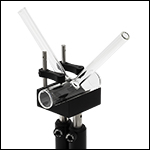
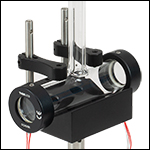
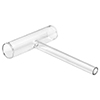

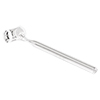

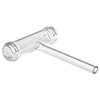


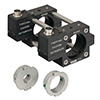
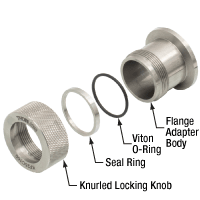
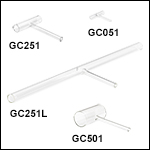
 Zoom
Zoom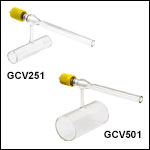
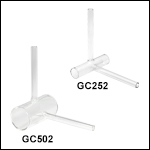
 Empty Glass Cells
Empty Glass Cells